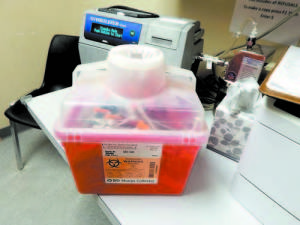Discarded needles are a big problem

NEEDLES, NEEDLES, EVERYWHERE — This plastic box at the Bridgton Police Department contains used needles, which up until recently were taken to Bridgton Hospital for disposal. The hospital, like other hospitals around the state, no longer offers disposal service, so the needles are taken to the Transfer Station for eventual incineration by Regional Waste Systems.
A mother's concern
By Wayne E. Rivet
Staff Writer
NAPLES — Nicole Corcoran-Allen is worried that kids face a serious danger at local ballfields and lack the knowledge of what to do to avoid harm.
One ritual of spring is for parents, kids and coaches to gather on a weekend day to cleanup baseball and softball fields. They usually spend a bulk of their time raking leaves, picking up litter and hauling off broken branches.
This spring, one volunteer group came across unexpected debris at the American Legion Field in Naples.
“As we were cleaning, one of the groups came across used needles — two empty and one that looked full,†Corcoran-Allen said. “My initial thought was who in the world would throw those (hypodermic needles) where kids play and thank God none of the kids found them or got hurt by one.â€
Used needles have also been found along roadways in Bridgton.
“I think police and people should pay more attention to places where kids play and people being there after hours. I think the areas should also be posted with some sort of sign,†Corcoran-Allen said.
To insure kids’ safety, Corcoran-Allen has thought about organizing a cleanup group, consisting of parents and volunteers, who would periodically check areas where kids play or take part in recreational activities.
“I also think that children should be made aware of what these (hypodermic needles) are and not to touch them,†she said. “Last year, my son almost stepped on one at the football field. He and my daughter wondered what it was and almost picked it up. I jumped in and said ‘no’ and told them both don’t ever touch them. A lot of kids have no clue and would pick it up.â€
Corcoran-Allen hopes schools and/or police will address the matter before a child is injured,
“They (kids) need to understand what they are (the needles) and not to touch them!†she added.
By Gail Geraghty
Staff Writer
In early May, two used hypodermic needles were found on the side of Middle Ridge Road in Bridgton. Three more were found this spring in Naples, when volunteers were raking leaves and clearing debris from the American Legion ballfield (see sidebar to this story).
Bridgton Interim Police Chief Jerry Hinton, said it’s a sign of the times, with the big jump in heroin use in Maine. “It’s a big problem, and it’s happening everywhere, even in Bridgton. What if there were kids walking on that road?â€
The Maine Office of the Attorney General’s analysis of deaths due to heroin found a shocking increase — from 34 deaths in 2013 to 57 deaths last year.
At the Bridgton Police Department, a plastic “sharps†box with a one-way slot on the lid is filled with around 100 used needles, either found or confiscated by police during their shifts. Sometimes residents turn the needles over to police, not knowing what else to do with them, Hinton said.
It used to be that when the box was full, Officer Donald “Mac†McCormick would bring it to Bridgton Hospital, where the needles would be disposed of along with other designated bio-hazard materials.
Bridgton Hospital is no longer offering that service, however, which leaves Bridgton Police — and the public — with no other option than bringing them to the Transfer Station to be incinerated.
“I hate to do that, but I’ve got to get rid of them,†Hinton said.
Hospital spokesperson Leslie Tyler confirmed that the hospital decided to no longer provide a disposal service for used needles, and is now advising patients on how to dispose of needles safely themselves. She said the needles can be placed in a large empty laundry detergent container, which should be capped and then taped securely around the cap using duct tape.
Then they can be brought to the dump, she said, where the container of needles will be eventually burned at the Regional Waste Systems incinerator.
Hinton said he wished there was a better way, since there is more of a chance for accidental exposure.
“You don’t know what nasty stuff is on the end of that needle,†he said. “If there’s no plastic tip on it, what’s going to happen?â€
But he said it appears Bridgton Police will be making periodic trips to the transfer station for needle disposal.
Hinton added that there are several other ways police are taking a proactive stance in coping with the rise in heroin use. Starting this year, all patrol officers of local departments like Bridgton’s will receive 10 hours of mandatory training in how to respond to drug overdoses due to heroin or other opiates. The officers will be told in what cases the Maine Drug Enforcement Agency should be contacted, and will learn about Narcan, an opioid antagonist used to counter the effects of opioid overdose.
Municipal officials, as well, are being proactive about the problem. Voters at the June 10 Town Meeting approved amendments to the town’s Safe Zones Ordinance that added several new locations to the list of fields, parks, playgrounds and recreation facilities where illegal drug use is expressly prohibited.
Added to the list was the BRAG recreation complex, Pondicherry Park Trail, Sabattus Island and Stevens Brook Trail properties. Anyone found trafficking, furnishing or cultivation drugs within 1,000 feet of those town-owned properties may be found guilty of an aggravated offense and suffer increased penalties.
Harrison Selectmen are planning to ask voters to pass their own Safe Zone Ordinance this November, and expect to hold a public hearing on the text sometime in early fall.


